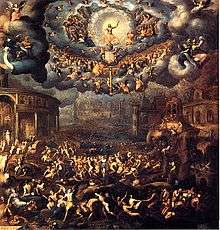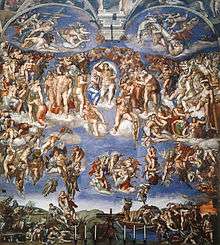
Last Judgment or Judgment Day is the final and eternal judgment by God of every person or society, a concept found in all Abrahamic religions, and elsewhere in faiths like Zoroastrianism and the Ancient Egyptian religious traditions about the Duat.
- See also:
Quotes
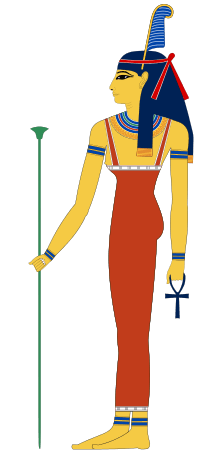
- Alphabetized by author or source

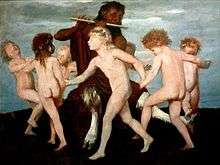

The Day of Judgment which the world awaits;
But be it so or not, I only know
My present duty, and my Lord's command
To occupy till He come. ~ Abraham Davenport, as portrayed by John Greenleaf Whittier
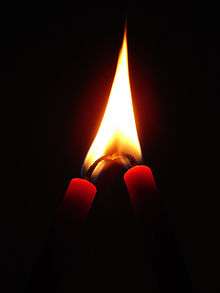
.jpg)
- Those who have deprived themselves of this Resurrection by reason of their mutual hatreds or by regarding themselves to be in the right and others in the wrong, were chastised on the Day of Resurrection by reason of such hatreds evinced during their night. Thus they deprived themselves of beholding the countenance of God, and this for no other reason than mutual denunciations.
- The Báb, in the Kitáb-I-Asmá (The Book of Names), XVI, 19.
- When, O crowned Jesus; when, O loving Saviour; when, O patient and just Judge — when wilt Thou come forth from Thy hiding, and change tears to smiles, and groans to joys? When shall that choral song burst forth, sweeping through the air, and circling about Thy throne, which shall proclaim the redemption of the world to the Lord God?
- Henry Ward Beecher, as reported in Dictionary of Burning Words of Brilliant Writers (1895) by Josiah Hotchkiss Gilbert, p. 410.
- Day of judgement, god is calling
on their knees the war pigs crawling.
Begging mercy for their sins,
Satan, laughing, spreads his wings...Oh lord, yeah!- Black Sabbath War Pigs Paranoid written by Ozzy Osbourne, Tony Iommi, Geezer Butler and Bill Ward
- Kill not the Moth nor Butterfly,
For the Last Judgement draweth nigh.- William Blake, "Auguries of Innocence" (ca. 1803).
- But this we may positively state, that nobody has made any progress in the school of Christ unless he cheerfully looks forward to the day of his death and to the day of the final resurrection.
- John Calvin, Golden Booklet of the True Christian Life, Page 78.
- N'attendez pas le Jugement dernier. Il a lieu tous les jours.
- Do not wait for the Last Judgment. It takes place every day.
- Albert Camus, The Fall (1956)
- Variant translations:
Do not await the last Judgement. It takes place everyday.
You needn't await the Final Judgment. It takes place every day.
I shall tell you a great secret, my friend. Do not wait for the Last Judgment. It takes place every day.
- Do not wait for the Last Judgment. It takes place every day.
- Cependant la terre chancelle sur ses bases, la lune se couvre d'un voile sanglant, les astres pendent à demi détachés de leur voûte: l'agonie du monde commence. Tout à coup l'heure fatale vient à frapper; Dieu suspend les flots de la création, et le monde a passé comme un fleuve tari.
Alors se fait entendre la trompette de l'ange du jugement; il crie: Morts, levez-vous! Surgite, mortui! Les sépulcres se fendent, le genre humain sort du tombeau, et les races s'assemblent dans Josaphat.
Le Fils de l'homme apparaît sur les nuées; les puissances de l'enfer remontent du fond de l'abîme pour assister au dernier arrêt prononcé sur les siècles; les boucs et les brebis sont séparés, les méchants s'enfoncent dans le gouffre, les justes montent dans les cieux; Dieu rentre dans son repos, et partout règne l'éternité.
- Meanwhile the globe begins to tremble on its axis; the moon is covered with a bloody veil, the threatening stars hang half detached from the vault of heaven, and the agony of the world commences. Then, all at once, the fatal hour strikes; God suspends the movements of the creation, and the earth has passed away like an exhausted river.
Now resounds the trumpet of the angel of judgment; and the cry is heard, "Arise, ye dead!" The sepulchres burst open with a terrific noise, the human race issues all at once from the tomb, and the assembled multitudes fill the valley of Jehoshaphat.
Behold, the Son of Man appears in the clouds; the powers of hell ascend from the depths of the abyss to witness the last judgment pronounced upon the ages; the goats are separated from the sheep, the wicked are plunged into the gulf, the just ascend triumphantly to heaven, God returns to His repose, and the reign of eternity commences.
- François-René de Chateaubriand, Le génie du Christianisme (1802), trans. Frederic Shoberl, part VI, book VII: Le dernier jugement.
- Meanwhile the globe begins to tremble on its axis; the moon is covered with a bloody veil, the threatening stars hang half detached from the vault of heaven, and the agony of the world commences. Then, all at once, the fatal hour strikes; God suspends the movements of the creation, and the earth has passed away like an exhausted river.
- I warrant you, if he danced till doomsday, he thought I was to pay the piper.
- William Congreve, Love for Love (1695), Act II, scene ii.
- These predictions of gloom and doom are largely the product of fear-mongering by all and sundry when they are not the deliberate creations of those nefarious forces who seek always to keep humanity enthralled. There will indeed be climatic change, upheaval and difficulties in many parts of the world, but not the exaggerated portents of catastrophe and disaster. It would almost seem that we cannot get enough of disaster to satisfy the emotional requirements of some people. The media play a huge part in the dissemination of this catastrophe syndrome by their sensational reportage. It must be good for the sale of newspapers and magazines. Change is always difficult for people, whether it is small changes or large changes. Changes of the kind which are transforming the world are particularly frightening for many people...
Maitreya said: “Have no fear. The end is known from the beginning. All will be well. All manner of things will be well.”
- Benjamin Creme in The Awakening of Humanity (2008)
- I am against an adjournment. The day of judgment is either approaching, or it is not. If it is not, there is no cause of an adjournment: if it is, I choose to be found doing my duty. I wish therefore that candles may be brought.
- Abraham Davenport, in a response to a call for adjourning the Connecticut State Council on New England's Dark Day (19 May 1780), because of fears that the deep darkness might be a sign that the Last Judgment was approaching, as quoted by Timothy Dwight, Connecticut Historical Collectons 2d ed (1836) compiled by John Warner Barber, p. 403.
- Dies iræ, dies illa
Solvet sæclum in favilla
Teste David cum Sibylla- Day of wrath! O day of mourning!
See fulfilled the prophets' warning,
Heaven and earth in ashes burning!- Dies Irae, 13th century, traditionally attributed to Thomas of Celano; trans. William Josiah Irons (1849).
- Day of wrath! O day of mourning!
- Now shall the promises made to Christ by God the Father before the foundation of the world, the promises of the covenant of redemption, be fully accomplished. Christ shall now have perfectly obtained the joy set before Him, for which He undertook those great sufferings in His state of humiliation. Now shall all the hopes and expectations of the saints be fulfilled. The state of the church before was progressive and preparatory; but now she is arrived at her most perfect state of glory. All the glory of the church on earth is but a faint shadow of this her consummate glory in heaven.
- Jonathan Edwards, A History of the Work of Redemption including a View of Church History (1839).
- Winds, storms, tempests, thunders, lightnings, raging flames, dissolving elements, the archangel's trump smiting the silence of the tomb, the universal air blazing with disastrous splendors, "the tribes of the earth mourning and beating their breasts," the wicked calling on rocks and hills to fall upon them and cover them, the shouts of the saved, the howlings of the damned — all, all will then utter one voice, all will pierce our very souls with their tones; all will repeat these words, "God alone is great, and God's salvation alone deserved the cares, toils, sacrifices of an immortal spirit."
- Richard Fuller, reported in Dictionary of Burning Words of Brilliant Writers (1895) by Josiah Hotchkiss Gilbert, p. 359.
- We are all approaching that dread tribunal. However diversified our paths, they all converge toward that common centre. The young, with their elastic tread, are striding to the judgment; the old, with their tottering limbs are creeping to the judgment; the rich in their splendid equipages are driving to the judgment; the poor, in rags and barefooted, are walking to the judgment. The Christian making God's statutes his song, is a pilgrim to the judgment; the sinner, treading upon the mercy of Jesus, and trampling upon His blood, is hastening to the judgment. "We must all appear before the judgment-seat of Christ."
- Richard Fuller, reported in Dictionary of Burning Words of Brilliant Writers (1895) by Josiah Hotchkiss Gilbert, p. 360.
- Standing on my watch-tower I am commanded, if I see aught of evil coming, to give warning. I solemnly declare that I do discern evil approaching; I see a storm collecting in the heavens; I discover the commotion of the troubled elements; I hear the roar of a distant wind — heaven and earth seem mingled in the conflict — and I cry to those for whom I watch, " A storm! A storm! Get you into the ark or you are swept away." Oh! what is it I see? I see a world convulsed and falling to ruins — the sea burning like oil —nations rising from under ground — the sun falling — the damned in chains before the bar, and some of my poor hearers among them! I see them cast from the battlements of the judgment scene. My God! the eternal pit has closed upon them forever!
- Edward Dorr Griffin, Sermons, vol. II (1839), sermon XXXIX: "The Watchman".
- Not every one that saith unto Me, “Lord, Lord,” shall enter into the Kingdom of Heaven; but he that doeth the will of my Father which is in Heaven. Many will say to Me in that day, “Lord, Lord, have we not prophesied in Thy name? And in Thy name have cast out devils? And in Thy name done many wonderful works?” And then will I profess unto them, “I never knew you: depart from Me, ye that work iniquity.”
- Jesus, in Matthew 7:21-23
- The deeds we do, the words we say,
Into still air they seem to fleet;
We count them ever past;
But they shall last —
In the dread judgment they
And we shall meet.- John Keble, "Early Warnings," from Lyra Innocentium (1846).
- Certe adveniente die judicii, non quæretur a nobis quid legimus, sed quid fecimus; nec quam bene diximus, sed quam religiose viximus.
- At the Day of Judgement we shall not be asked what we have read but what we have done; not how well we have spoken, but how holy we have lived.
- Thomas à Kempis, Imitation of Christ (c. 1418), Book I, ch. 3.
- At the Day of Judgement we shall not be asked what we have read but what we have done; not how well we have spoken, but how holy we have lived.
- When the Son of Man shall come in His glory, and all the holy angels with Him, then shall He sit upon the throne of his glory: And before Him shall be gathered all nations: and He shall separate them one from another, as a shepherd divideth his sheep from the goats: And He shall set the sheep on his right hand, but the goats on the left. Then shall the King say unto them on his right hand, “Come, ye blessed of my Father, inherit the Kingdom prepared for you from the foundation of the world: for I was hungry, and ye gave Me meat; I was thirsty, and ye gave Me drink; I was a stranger, and ye took Me in; naked, and ye clothed Me; I was sick, and ye visited Me; I was in prison, and ye came unto Me.” Then shall the righteous answer him, saying, “Lord, when saw we Thee hungry, and fed Thee? Or thirsty, and gave Thee drink? When saw we Thee a stranger, and took Thee in? Or naked, and clothed Thee? Or when saw we Thee sick, or in prison, and came unto Thee?” And the King shall answer and say unto them, “Verily I say unto you, inasmuch as ye have done it unto one of the least of these my brethren, ye have done it unto Me.” Then shall He say also unto them on the left hand, “Depart from Me, ye cursed, into everlasting fire, prepared for the Devil and his angels: for I was hungry, and ye gave Me no meat; I was thirsty, and ye gave Me no drink; I was a stranger, and ye took Me not in; naked, and ye clothed Me not; sick, and in prison, and ye visited Me not.” Then shall they also answer Him, saying, “Lord, when saw we Thee hungry, or thirsty, or a stranger, or naked, or sick, or in prison, and did not minister unto Thee?” Then shall He answer them, saying, “Verily I say unto you, inasmuch as ye did it not to one of the least of these, ye did it not to Me.” And these shall go away into everlasting punishment: but the righteous into life eternal.
- Glorious transformation! glorious translation! I seem already to behold the wondrous scene. The sea and the land have given up their dead! the quickened myriads have been judged according to their works. And now, an innumerable company, out of all nations and tribes and tongues, ascend with the Mediator towards the kingdom of His Father. Can it be that these, who were born children of earth, who were long enemies to God by wicked works, are to enter the bright scenes of paradise? Yes, He who leads them has washed them in His blood; He who leads them has sanctified them by His Spirit.
- Henry Melvill, Sermons 1833-8, vol. II (1870), sermon VII: "The Ascension of Christ".
- Then, when the glorious end,
The day of God shall come,
The angel reapers shall descend,
And heaven sing, "Harvest-home!"- James Montgomery, "The Field of the World" (1832), from Original Hymns (1853).
- Avoid cruelty and injustice for, on the Day of Judgment, the same will turn into several darknesses; and guard yourselves against miserliness; for this has ruined nations who lived before you.
- Muhammed, Riyadh-us-Salaheen, Hadith 203.
- The ink of scholars is weighed on the Day of Judgement with the blood of martyrs and the ink of scholars out-weighs the blood of martyrs.
- Muhammad, as quoted in Al-Jaami' al-Saghîr by Imam al-Suyuti, where it is declared a "weak Hadith".
- I have not shut my ears to the words of truth.
I have not blasphemed.
I am not a man of violence.
I am not a stirrer up of strife.
I have not judged with undue haste.
I have not pried into matters.
I have not multiplied my words in speaking.
I have wronged none, I have done no evil.- Confessions 26 - 33 of the 42 Confessions to the Goddess Maat in the Papyrus of Ani (c. 1240 BC).
- Oh, on that day, that wrathful day,
When man to judgment wakes from clay.
Be Thou, O Christ, the sinner's stay,
Though heaven and earth shall pass away.- Walter Scott, The Lay of the Last Minstrel (1805), canto VI, stanza 31.
- Oh, remember that as certain as the historical fact,— He died on Calvary; so certain is the prophetic fact, He shall reign, and you and I will stand there. I durst not touch that subject. Take it into your own hearts, and think about it,— a kingdom, a judgment-seat, a crown, a gathered universe; separation, decision, execution of the sentence.
- Alexander Maclaren, Sermons Preached in Union Chapel, Manchester (1859), sermon XIII: "The Dying Thief".
- We should not hold on so strongly to those who are going to leave us some day anyway. We should not feel excessive attachment for them. We have to keep it in moderation. But there is One who will never leave us, One who will never perish. God will never leave us, not in the kingdom of heaven, nor in the kingdom of hell, nor in this world. And since judgment is in His hands, He is the only attachment we must have. If we hold on to only that one attachment, then we will have joy throughout our lives and even at the time of death. On Judgment Day we will know that joy, because we will be with Him.
- Bawa Muhaiyaddeen, Questions of Life Answers of Wisdom (2001), Vol. 1.
- "Judgement day," he said in a mocking voice. "Ain't no judgement day, old man. Cept this. Maybe this here judgement day for you."
- Surely they think it to be far off, and We see it nigh: on the day when the heaven shall be as molten copper, and the mountains shall be as tufts of wool, and friend shall not ask of friend (though) they shall be made to see each other.
- Qur'an, Sura 70:6-11.
- Wearily have the years passed, I know; wearily to the pale watcher on the hill who has been so long gazing for the daybreak; wearily to the anxious multitudes who have been waiting for his tidings below. Often has the cry gone up through the darkness, "Watcher, what of the night?" and often has the disappointing answer come, "It is night still; here the stars are clear above me, but they shine afar, and yonder the clouds lower heavily, and the sad night winds blow." But the time shall come, and perhaps sooner than we look for it, when the countenance of that pale watcher shall gather into intenser expectancy, and when the challenge shall be given, with the hopefulness of a nearer vision, "Watcher, what of the night?" and the answer will come," The darkness is not so dense as it was; there are faint streaks on the horizon's verge; mist is in the valleys, but there is a radiance on the distant hill. It comes nearer — that promise of the day. The clouds roll rapidly away, and they are fringed with amber and gold. It is, it is the blest sunlight that I feel around me — Morning! It is Morning!"
- William Morley Punshon, reported in Dictionary of Burning Words of Brilliant Writers (1895) by Josiah Hotchkiss Gilbert, p. 410.
- When the sun is overthrown, and when the stars fall, and when the camels big with young are abandoned, and when the wild beasts are herded together, and when the seas rise, and when souls are reunited, and when the girl-child that was buried alive is asked for what sin she was slain, and when the pages are laid open, and when the sky is torn away, and when hell is lighted, and when the Garden is brought nigh, (then) every soul will know what it hath made ready.
- Qur'an, Sura 81:1-14.
- When the Judgment Day comes civilization will have an alibi, "I never took a human life, I only sold the fellow the gun to take it with."
- Will Rogers, as quoted in The Quotable Will Rogers (2006) by Joseph H. Carter.
- “When you see a slave woman giving birth to her master-that is one sign; when you see barefooted, naked, deaf and dumb as the rulers of the earth-that is one of the signs of Doom. And when you see the shepherds of the black camels exult in buildings-that is one of the signs of Doom” (6).
- Sahih Muslim. Quoted from Ram Swarup, Understanding Islam through Hadis, 1983.
- Extenuating circumstance to be mentioned on Judgment Day: We never asked to be born in the first place.
- "It is the Lord's Great Day! Let us adjourn,"
Some said; and then, as if with one accord,
All eyes were turned to Abraham Davenport.
He rose, slow cleaving with his steady voice
The intolerable hush. "This well may be
The Day of Judgment which the world awaits;
But be it so or not, I only know
My present duty, and my Lord's command
To occupy till He come. So at the post
Where He hath set me in His providence,
I choose, for one, to meet Him face to face, —
No faithless servant frightened from my task,
But ready when the Lord of the harvest calls;
And therefore, with all reverence, I would say,
Let God do His work, we will see to ours.
Bring in the candles." And they brought them in.- John Greenleaf Whittier in his poem "Abraham Davenport" first published in The Atlantic Monthly (May 1866); later published in The Tent on the Beach, and Other Poems (1867).
- Turning and turning in the widening gyre
The falcon cannot hear the falconer;
Things fall apart; the centre cannot hold;
Mere anarchy is loosed upon the world,
The blood-dimmed tide is loosed, and everywhere
The ceremony of innocence is drowned;
The best lack all conviction, while the worst
Are full of passionate intensity.- William Butler Yeats, "The Second Coming", lines 1–8, in ed. Peter Allt and Russell K. Alspach, The Variorum Edition of the Poems of W. B. Yeats (1957), pp. 401–2.
- Due to the lack of experienced trumpeters, the end of the world has been postponed for three weeks.
- Author unknown; found on a handmade cardboard sign hung in the United States Capitol, House Rules Committee chambers, c. 1970. Photocopies of this sentence have appeared on the walls of other work areas in the Capitol. Reported in Respectfully Quoted: A Dictionary of Quotations (1989).
- The world must be coming to an end. Children no longer obey their parents and every man wants to write a book.
- Author unknown, attributed (perhaps spuriously) to the writing on a tablet, unearthed not far from Babylon and dated back to 2800 B.C.; reported in Leewin B. Williams, Encyclopedia of Wit, Humor and Wisdom (1949), p. 299. Reported in an expanded version as "Our earth is degenerate in these latter days; there are signs that the world is speedily coming to an end; bribery and corruption are common; children no longer obey their parents; every man wants to write a book and the end of the world is evidently approaching", attributed to an Assyrian stone tablet of about 2800 B.C., reported in William L. Patty and Louise S. Johnson, Personality and Adjustment (1953), p. 277. Possibly related to Ecclesiastes 12:12, "of making many books there is no end".
